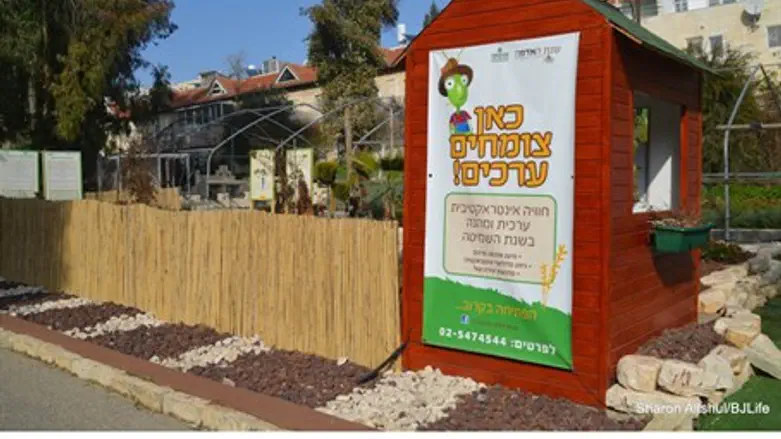
Rabbi Yosef Zvi Rimon has been a prolific writer in the religious Zionist community for years, and his recent publications on Shemittah - the Jewish agricultural sabbatical year - have been met with wide acclaim both in Hebrew and in English.
Speaking to Arutz Sheva, he revealed that in his mind, his greatest recent achievement is not the publications, but rather the new Shemittah Park, a joint project with JobKatif and a component of the Jerusalem Botanical Gardens.
The objective of the park is to illustrate critical concepts in the laws of Shemittah. The park utilizes stations, arrangements of plants and trees, plus an app that utilizes GPS to pinpoint where in the park a visitor might be. The app goes on to explain what each station in the park represents from a Jewish legal point of view, as well as other meanings.
“Shemittah addresses the relationship between man and God, the relationship between man and his fellow man, the relationship between man and his land. It combines all these concepts and principles into one, for everyone," said the rabbi.
For Rabbi Rimon, he sees the park as a more effective way of teaching the concepts of Shemittah which might otherwise be lost in text. The objective is to make sense of the often overlooked (and historically under-studied) codices of the Jewish sabbatical year.
What the Shemittah often elicits from observant Jews is controversy over how it is observed, namely bitter arguments over the permissibility of temporary sales of land to non-Jews so that the land can be allowed to be productive during the year. The objective in the park is to refocus the Shemittah year to the positive socioeconomic impact the cycle can have.
As Deputy Minister for Religious Affairs Rabbi Eli Ben-Dahan said during the park’s opening ceremony, the park’s strength is that it communicates “in a way that does not stress the Halakhic (Jewish legal) controversies involved, but rather focuses on the wonderful values of caring, kindness, and an economic system that gives each individual a fresh start every seven years.”
It's an opportunity to transmit the values and principles of the sabbatical year into modern terms. Given that most Jews are not farmers, much of the context for those values might distract Torah learners from how to apply them in a modern context.
Rabbi Rimon also sees an opportunity to define a theory for Jewish economics using the sabbatical year as a springboard. Whereas many economies use different mixtures of capitalist and socialist principles, Judaism enacts a cyclical one.
“There’s something amazing in the Jewish economy. There are two main systems: capitalism and socialism. With one you are allowed to earn what you can, but with the other you are obligated to help the rest of the community.”
"The Shemittah adds another level. Every seven years, everyone stops. Instead of chasing after money, they are opening their wallets and assets to everyone. Everyone is dealing with hessed (kindness - ed.)."
The Torah expects a balance, where a freer market dominates the Land of Israel in the intermediate years, but gives way to an anarchic situation in a sort of socioeconomic reboot for the country. That reboot demands much of people living in Jewish society, namely focusing their economic efforts toward investing their production and profits back into society.
The Rabbi explained that he has given dozens of classes across the country on the subject, including one at the Israeli Knesset, where he was approached by someone afterwards.
“He said, ‘the Shemittah year is so beautiful. I do not understand why we don’t have it every year.’ I told him, ‘You didn’t understand the shiur (class).’ We need competition in society. These laws come in once every seven years, otherwise there would be less money to give out and these principles wouldn’t be appreciated.”
One of the activities that Rabbi Rimon most likes about the new park is an inverse play on the custom of leaving prayers on notes at the Western Wall in Jerusalem. Here, visitors are invited to write not what they would want to receive, but what the plan to give.
“It’s amazing to read all these notes in Hebrew or English or Arabic. What people write there can really bring him to be a better person," he said. “It’s something special and something practical for all the visitors.”
Shemittah Park Sharon Altshul